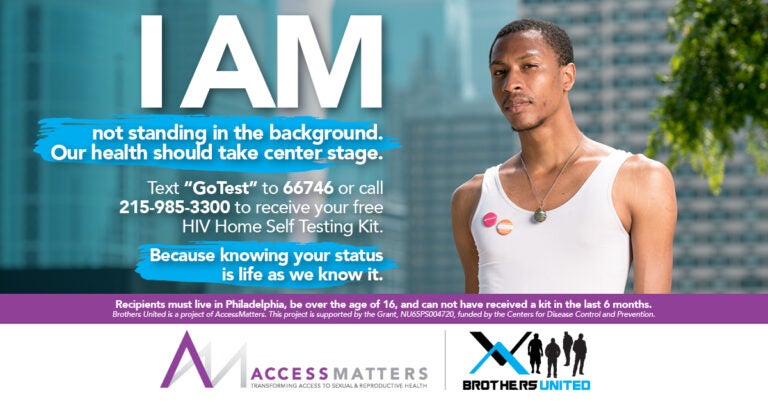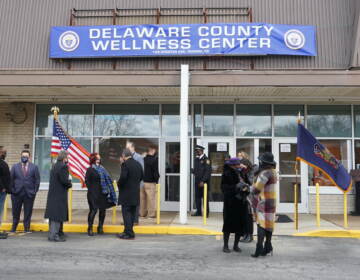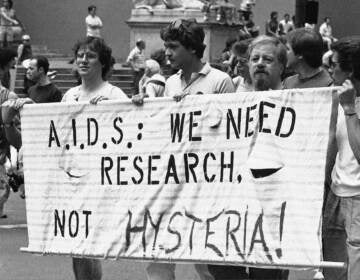Philly nonprofit pivots to promoting at-home HIV testing during pandemic
“Life As We Know It” focuses on empowering Black and Latino men in Philly ages 18 through 45 to get tested for HIV through an at-home kit.

(courtesy of AccessMatters)
When the coronavirus pandemic hit Philadelphia, sexual and reproductive health nonprofit AccessMatters went from serving 100 to 250 people in their neighborhoods monthly to zero.
Through a grant from the Centers for Disease Control and Prevention, AccessMatters has been providing one-on-one, community-based HIV testing in Philly neighborhoods through a mobile unit for several years. They specifically focus on helping individuals who may not feel comfortable getting tested in a clinical, office-based setting, and in neighborhoods with larger populations of Black and Latino men, who have had higher infection rates in the city in recent years.
They would also do outreach in neighborhoods, handing out condom kits and information about the antiviral HIV/AIDS prevention drug PrEP.
“We really had to reimagine what testing would really look like under these conditions,” said LaToya Myers, AccessMatters’ vice president of health access and service delivery. “With COVID-19 really hitting all of us, we had to rethink how we engage with our clients.”
AccessMatters launched “Life As We Know It” last week, a social media campaign focused on empowering Black and Latino men in Philly ages 18 through 45 to get tested for HIV through an at-home kit. The campaign — which features advertisements on dating apps like Grindr, Plenty of Fish and Jack’d, as well as Facebook and Instagram — is in partnership with the Philadelphia AIDS Activities Coordinating Office and the city health department.
The ads promote reaching out by texting “GoTest” to 66746 or by calling 215-985-3300 to receive a free HIV home self-testing kit. Those who are eligible to receive the test must live in Philadelphia, be over the age of 16, and have not received a home test in the last six months.
The test kit includes OraQuick, an FDA-approved at-home swab for HIV 1 and HIV 2 that will come with directions on how to administer.
Myers said the campaign’s messaging stemmed from trying to find a new access point to continue getting testing into high-risk neighborhoods as community-based testing was no longer an option for the immediate period.
“COVID pushed us in a direction faster than we may have moved if we were still doing community-based testing,” Myers said. “But this can be an addition to the menu of what we provide and what we want to do after the pandemic.”
The campaign — which runs through June 30 — is led by Brothers United, a project of AccessMatters focused on providing free sexual health screenings to Black men.
To recognize National HIV Testing Day on Saturday, AccessMatters will host a conversation via Facebook Live from 1 to 2 p.m., to discuss normalizing at-home testing, reducing HIV stigma and to help create an environment in which Black and Latino men who are at high risk for HIV know their status.
As far as the campaign’s success so far, Myers said AccessMatters has already received several inquiries from people interested in an at-home test kit. The tests will take 7-10 days to arrive via mail.
If the test is requested through AccessMatters, they’ll do a follow-up call a few days after its requested and provide information and counseling on what the process will look like. Individuals can also call AccessMatters when their test kit comes in and get a walkthrough if needed.
AccessMatters will continue to provide the at-home kits after the campaign ends.
Myers said, even post-coronavirus, she envisions that the push for at-home testing kits will continue, along with continuing to support people in their communities again once it’s safe to do so.
“What we know is that there are certain people that will go into a community health center to get a test and others will do so in their own community,” Myers said. “And others that will love being in any place, either at their home or in a place they feel safe. This is really an opportunity to expand and enhance sexual and reproductive health care and we want to make sure we continue down that path.”
The Mazzoni Center and Bebashi are among other Philly nonprofits currently providing at-home HIV test kits.

Get daily updates from WHYY News!
WHYY is your source for fact-based, in-depth journalism and information. As a nonprofit organization, we rely on financial support from readers like you. Please give today.





